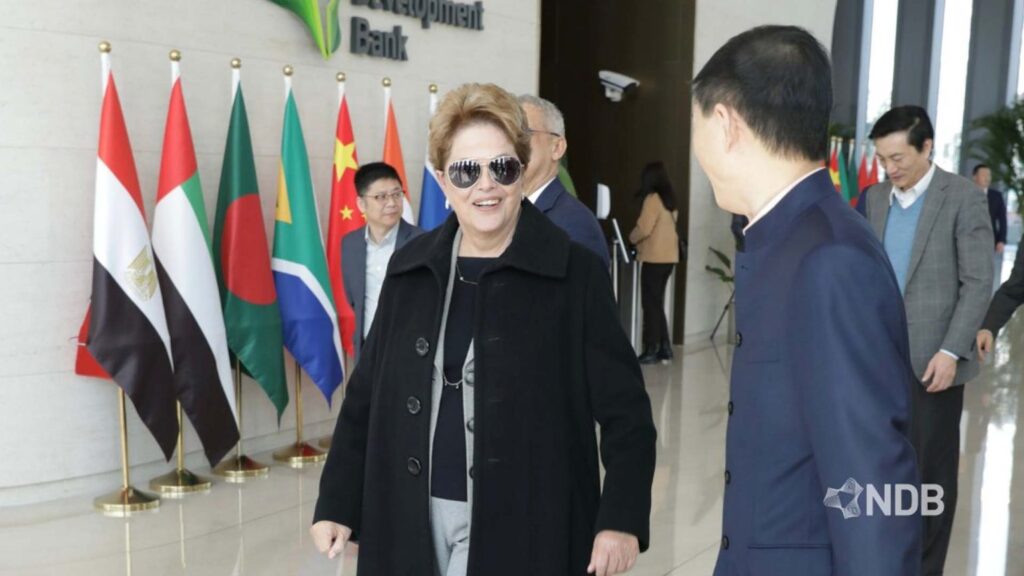The New Development Bank plans to give nearly one-third (30%) of its loans in the local currencies of the financial institution’s members.
Dilma Rousseff, the left-wing former president of Brazil, took over the leadership of the Shanghai, China-based New Development Bank (NDB) this March.
The new chief of the BRICS' New Development Bank, Brazil’s leftist ex-President Dilma Rousseff, revealed they are gradually moving away from the US dollar, promising at least 30% of loans in local currencies of members.
More here: https://t.co/CyJKBODc2D pic.twitter.com/PUGokEHYxw
— Ben Norton (@BenjaminNorton) April 15, 2023
The NDB was created in 2014, by the BRICS bloc of Brazil, Russia, India, China, and South Africa, as a Global South-oriented alternative to the US-dominated World Bank, which is infamous for imposing neoliberal economic reforms on impoverished countries, which hinder their development.
In an interview with China’s major media outlet CGTN on April 14, Rousseff explained, “It is necessary to find ways to avoid foreign exchange risk and other issues, such as being dependent on a single currency, such as the US dollar”.
“The good news is that we are seeing many countries choosing to trade using their own currencies. China and Brazil, for instance, are agreeing to exchange with RMB (renminbi) and the Brazilian real”, she said.
“At the NDB, we have committed to it in our strategy. For the period from 2022 to 2026, the NDB has to lend 30% in local currencies, so 30% of our loan book will be financed in the currencies of our member countries”, Rousseff added.
“That will be extremely important to help our countries avoid exchange rate risks and shortages in finance that hinder long-term investments”, the new NDB president stressed.
H.E. Mrs. Dilma Rousseff, the NDB newly elected President, has started her first day in office in the NDB Headquarters in Shanghai, China. pic.twitter.com/JOLblXhhzQ
— New Development Bank (@NDB_int) March 28, 2023
Members of the NDB not only include the founders of the BRICS but also Bangladesh, the UAE, and Egypt. Uruguay is likewise in the process of joining, and many other countries have expressed interest.
Argentina, Iran, and Algeria have formally applied to join the extended BRICS+ bloc, and according to the foreign minister of Russia, Sergei Lavrov, other nations that are interested “include Egypt, Turkey, Saudi Arabia, the United Arab Emirates, Indonesia, Argentina, Mexico, and a number of African nations”.

Flags of the members of the BRICS bloc’s New Development Bank (NDB)
South Africa’s foreign minister, Naledi Pandor, revealed in January that BRICS plans to “develop a fairer system of monetary exchange” in order to weaken the “dominance of the dollar”.
“The systems currently in place tend to privilege very wealthy countries and tend to be really a challenge for countries, such as ourselves, which have to make payments in dollars, which costs much more in terms of our various currencies”, she said.
“So I do think a fairer system has to be developed, and it’s something we’re discussing with the BRICS ministers in the economic sector discussions”, Pandor added.
BRICS is making “a fairer system of monetary exchange” to challenge the “dominance of the dollar”, South Africa revealed.
Saudi Arabia, which applied to join BRICS, is considering selling oil in other currencies.
China says it will by Gulf energy in yuanhttps://t.co/fDWhqExVAw
— Geopolitical Economy Report (@GeopoliticaEcon) March 13, 2023
This April, Brazil’s current president, Lula da Silva, a fellow member of Dilma’s leftist Workers’ Party, took a historic trip to China, where he called to challenge US dollar dominance.
While in Shanghai, Lula was the first head of state to visit the NDB headquarters, where he attended the swearing in ceremony for Dilma.
Lula said the NDB’s goal is “creating a world with less poverty, less inequality, and more sustainability”.
He added that the bank should play a “leading role in achieving a better world, without poverty or hunger”.
This was the first time that a Head of State visited the Bank's Headquarters in Shanghai and addressed the NDB staff in person. President Lula had the opportunity to witness the NDB's commitment to promoting sustainable development and delivering on its mandate.#NDB #BRICS pic.twitter.com/MlC9tfySPY
— New Development Bank (@NDB_int) April 13, 2023
Dilma also commented, “As a former president of Brazil, I know the importance of the work of multilateral banks to support developing countries, particularly NDB, in addressing their economic, social, and environmental needs”.
“Becoming the president of the NDB is undoubtedly a great opportunity to do more for the BRICS, the emerging markets, and developing countries”, she said.
In her speech, H.E. Mrs. Dilma Rousseff emphasized the Bank's commitment to supporting Brazil's sustainable development goals and highlighted the importance of the presidential visit for strengthening the cooperation between the NDB and Brazil.#NDB #BRICS pic.twitter.com/0aut3dLM1H
— New Development Bank (@NDB_int) April 13, 2023
In her interview with CGTN, Rousseff explained her goals with the BRICS Bank:
It is very important to me that New Development Bank, the bank of the BRICS, acts as the tool to support the development priorities of the BRICS and other developing countries.
We need to invest in projects that contribute to three fundamental areas:
First, we need to support the countries with regards to climate change and sustainable development goals.
Second, we should promote social inclusion at every opportunity we have.
And I believe we should finance their most critical and strategic infrastructure projects.
That said, we want to promote quality development.
Developing countries still don’t have the necessary infrastructure. They don’t have enough ports, airports, and highways to meet their needs. And many times, the ones they have are not adequate.
They still have to build alternatives and more modern models of transportation, for instance.
I see China, a country that has developed capability for alternative transportation at the scale and quality it needs.
NDB has to support the other countries to also build their quality infrastructure as well, like high-speed trains.
It is very important to invest in technology and innovation, invest in universities for example.
Our countries will not overcome extreme poverty if we don’t invest in education, science, and technology.
When asked what challenges the BRICS and NDB face, Rousseff replied:
The world now is under the threat of high inflation and restrictive monetary policy, particularly in developed countries.
Such monetary policy means a higher interest rate, and therefore a higher probability of reduction in growth and a higher probability of recession.
This presents an important question for the BRICS. We need a mechanism, a so-called anti-crisis mechanism, which must be counter-cyclical and support stabilization.
It is necessary to find ways to avoid foreign exchange risk and other issues, such as being dependent on a single currency, such as the US dollar.
The good news is that we are seeing many countries choosing to trade using their own currencies.
China and Brazil, for instance, are agreeing to exchange with RMB (renminbi) and the Brazilian real.
At the NDB, we have committed to it in our strategy. For the period from 2022 to 2026, the NDB has to lend 30% in local currencies, so 30% of our loan book will be financed in the currencies of our member countries.
That will be extremely important to help our countries avoid exchange rate risks and shortages in finance that hinder long-term investments.
_____________________________________
 Benjamin Norton is an investigative journalist, analyst, writer and filmmaker. He is the founder and editor of Multipolarista and is based in Latin America. His website: BenNorton.com (Publicaciones en español aquí.)
Benjamin Norton is an investigative journalist, analyst, writer and filmmaker. He is the founder and editor of Multipolarista and is based in Latin America. His website: BenNorton.com (Publicaciones en español aquí.)
